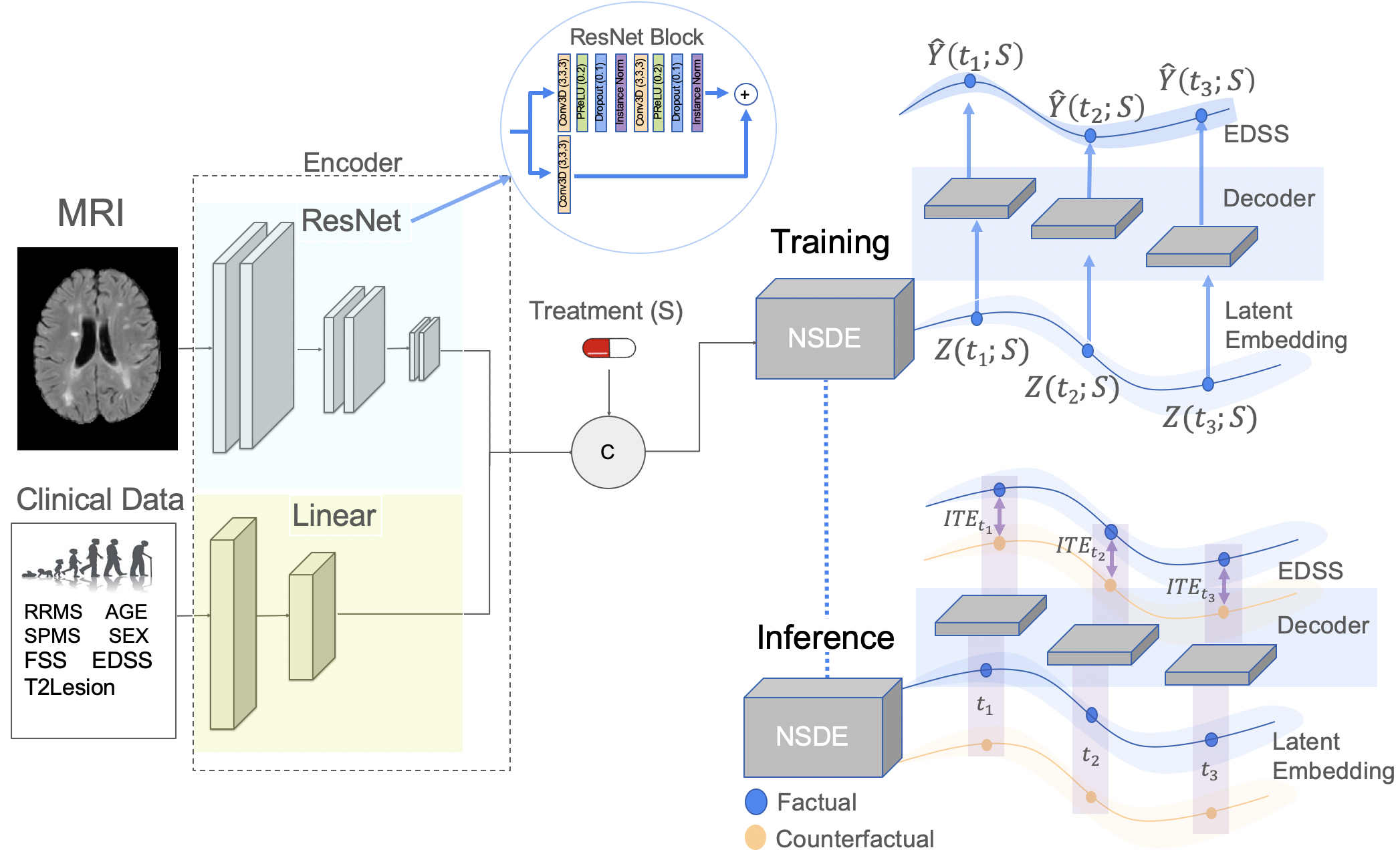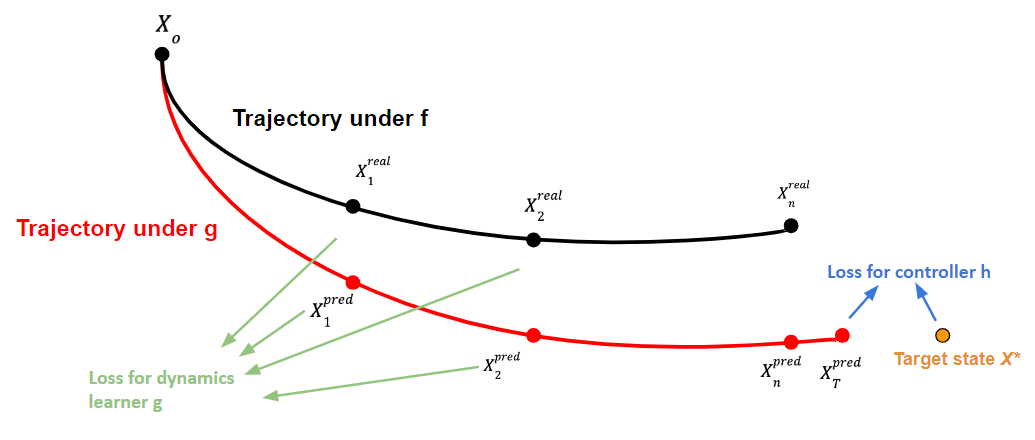Bayesian Neural Controlled Differential Equations for Treatment Effect Estimation
2310.17463

0
0
🧠
Abstract
Treatment effect estimation in continuous time is crucial for personalized medicine. However, existing methods for this task are limited to point estimates of the potential outcomes, whereas uncertainty estimates have been ignored. Needless to say, uncertainty quantification is crucial for reliable decision-making in medical applications. To fill this gap, we propose a novel Bayesian neural controlled differential equation (BNCDE) for treatment effect estimation in continuous time. In our BNCDE, the time dimension is modeled through a coupled system of neural controlled differential equations and neural stochastic differential equations, where the neural stochastic differential equations allow for tractable variational Bayesian inference. Thereby, for an assigned sequence of treatments, our BNCDE provides meaningful posterior predictive distributions of the potential outcomes. To the best of our knowledge, ours is the first tailored neural method to provide uncertainty estimates of treatment effects in continuous time. As such, our method is of direct practical value for promoting reliable decision-making in medicine.
Create account to get full access
Overview
- Personalized medicine requires accurate estimation of treatment effects over time, which is a crucial task.
- Existing methods only provide point estimates of potential outcomes, ignoring the important aspect of uncertainty quantification.
- This paper proposes a novel Bayesian neural controlled differential equation (BNCDE) model to address this gap and provide uncertainty estimates of treatment effects in continuous time.
Plain English Explanation
The paper discusses the importance of estimating the effects of medical treatments over time, which is essential for personalized medicine. Existing methods can only provide a single, fixed estimate of the potential outcomes of a treatment, without giving any information about the uncertainty or range of possible outcomes.
However, in medical decision-making, it's crucial to have a good understanding of the uncertainty around the expected outcomes, as this helps doctors and patients make more informed and reliable decisions. To address this, the researchers have developed a new Bayesian neural network model called BNCDE (Bayesian Neural Controlled Differential Equation) that can estimate the potential outcomes of treatments over time, while also providing a measure of the uncertainty around those estimates.
Technical Explanation
The BNCDE model proposed in the paper uses a combination of neural ordinary differential equations and neural stochastic differential equations to model the time dimension and the uncertainty in the treatment effects. This allows the model to generate probabilistic predictions of the potential outcomes, rather than just point estimates.
The use of neural networks and differential equations enables the BNCDE model to capture the complex, time-varying relationships between treatments and outcomes in a flexible and data-driven way. The Bayesian formulation of the model also allows for principled uncertainty quantification, which is a key advantage over previous methods.
Critical Analysis
The paper acknowledges that the BNCDE model is the first of its kind to provide uncertainty estimates for treatment effect estimation in continuous time, which is an important contribution to the field of personalized medicine. However, the authors also note that the model's performance and practical utility will need to be further evaluated through additional experimentation and real-world testing.
One potential limitation of the BNCDE approach is the computational complexity and training challenges associated with the coupled system of neural differential equations. The authors suggest that further research is needed to improve the scalability and efficiency of the model, which could limit its immediate applicability in some clinical settings.
Additionally, the paper does not extensively discuss the interpretability of the BNCDE model, which is an important consideration for medical applications where transparency and explainability are highly valued. Future work could explore ways to improve the interpretability of the model's predictions and uncertainty estimates.
Conclusion
This paper presents a novel Bayesian neural controlled differential equation (BNCDE) model that addresses a crucial gap in the field of treatment effect estimation for personalized medicine. By providing uncertainty estimates in addition to point predictions, the BNCDE model has the potential to significantly improve the reliability of medical decision-making and promote better patient outcomes. While further research is needed to refine and validate the model, this work represents an important step forward in the development of advanced, data-driven tools for personalized healthcare.
This summary was produced with help from an AI and may contain inaccuracies - check out the links to read the original source documents!
Related Papers

Probabilistic Temporal Prediction of Continuous Disease Trajectories and Treatment Effects Using Neural SDEs
Joshua Durso-Finley, Berardino Barile, Jean-Pierre Falet, Douglas L. Arnold, Nick Pawlowski, Tal Arbel

0
0
Personalized medicine based on medical images, including predicting future individualized clinical disease progression and treatment response, would have an enormous impact on healthcare and drug development, particularly for diseases (e.g. multiple sclerosis (MS)) with long term, complex, heterogeneous evolutions and no cure. In this work, we present the first stochastic causal temporal framework to model the continuous temporal evolution of disease progression via Neural Stochastic Differential Equations (NSDE). The proposed causal inference model takes as input the patient's high dimensional images (MRI) and tabular data, and predicts both factual and counterfactual progression trajectories on different treatments in latent space. The NSDE permits the estimation of high-confidence personalized trajectories and treatment effects. Extensive experiments were performed on a large, multi-centre, proprietary dataset of patient 3D MRI and clinical data acquired during several randomized clinical trials for MS treatments. Our results present the first successful uncertainty-based causal Deep Learning (DL) model to: (a) accurately predict future patient MS disability evolution (e.g. EDSS) and treatment effects leveraging baseline MRI, and (b) permit the discovery of subgroups of patients for which the model has high confidence in their response to treatment even in clinical trials which did not reach their clinical endpoints.
6/19/2024

Log Neural Controlled Differential Equations: The Lie Brackets Make a Difference
Benjamin Walker, Andrew D. McLeod, Tiexin Qin, Yichuan Cheng, Haoliang Li, Terry Lyons

0
0
The vector field of a controlled differential equation (CDE) describes the relationship between a control path and the evolution of a solution path. Neural CDEs (NCDEs) treat time series data as observations from a control path, parameterise a CDE's vector field using a neural network, and use the solution path as a continuously evolving hidden state. As their formulation makes them robust to irregular sampling rates, NCDEs are a powerful approach for modelling real-world data. Building on neural rough differential equations (NRDEs), we introduce Log-NCDEs, a novel, effective, and efficient method for training NCDEs. The core component of Log-NCDEs is the Log-ODE method, a tool from the study of rough paths for approximating a CDE's solution. Log-NCDEs are shown to outperform NCDEs, NRDEs, the linear recurrent unit, S5, and MAMBA on a range of multivariate time series datasets with up to $50{,}000$ observations.
6/12/2024
🧠
Neural Controlled Differential Equations with Quantum Hidden Evolutions
Lingyi Yang, Zhen Shao

0
0
We introduce a class of neural controlled differential equation inspired by quantum mechanics. Neural quantum controlled differential equations (NQDEs) model the dynamics by analogue of the Schr{o}dinger equation. Specifically, the hidden state represents the wave function, and its collapse leads to an interpretation of the classification probability. We implement and compare the results of four variants of NQDEs on a toy spiral classification problem.
5/1/2024

Neural Control: Concurrent System Identification and Control Learning with Neural ODE
Cheng Chi

0
0
Controlling continuous-time dynamical systems is generally a two step process: first, identify or model the system dynamics with differential equations, then, minimize the control objectives to achieve optimal control function and optimal state trajectories. However, any inaccuracy in dynamics modeling will lead to sub-optimality in the resulting control function. To address this, we propose a neural ODE based method for controlling unknown dynamical systems, denoted as Neural Control (NC), which combines dynamics identification and optimal control learning using a coupled neural ODE. Through an intriguing interplay between the two neural networks in coupled neural ODE structure, our model concurrently learns system dynamics as well as optimal controls that guides towards target states. Our experiments demonstrate the effectiveness of our model for learning optimal control of unknown dynamical systems. Codes available at https://github.com/chichengmessi/neural_ode_control/tree/main
4/23/2024